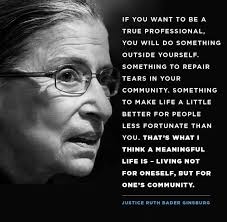What Ruth Taught Us About Dissent
Hearing that Ruth Bader Ginsburg died felt like hearing that Donald Trump was going to be the president after the election in 2016. At my age, after what felt like a lifetime of putting up with sexual harassment and discrimination, Trump’s election felt like a slap in the face, a major fall backwards, and a hopeless realization that true equality for women might not be realized in my lifetime. In the ensuing years, Ruth Bader Ginsburg’s fight for justice on the Supreme Court kept me going. If Ruth was there, somehow it felt like there was still hope. I was hoping that she would just hold on – until Trump was out of office.
When I heard she died, that final hope, that small chance that we might have a better president pick her successor was lost. With Ruth Bader Ginsburg’s death, women have not only lost a champion for women’s rights, we have not only lost the hope of having a progressive justice replace her, we now have to face the potential loss of many rights we’ve spend years fighting for – including and especially Roe v. Wade.
It seems ironic to me that Chief Justice John Roberts, when he announced her death said, “Our nation has lost a justice of historic stature. We at the Supreme Court have lost a cherished colleague. Today we mourn but with confidence that future generations will remember Ruth Bader Ginsburg as we knew her, a tireless and resolute champion of justice.” The reality is that he and many of his male colleagues, and most likely Ginsburg’s replacement, will not hesitate to undo all she stood for and championed throughout her life.

Thinking about Trump picking Ginsburg’s replacement and the Republican Senators willingness to push such a pick through, leads to a “woe is me” scenario that makes it hard to hold onto hope. Along with the Supreme Court being conservative for decades, there’s the issue that this conservative court will be the ones who decide on the election if it should be close. Even if Biden wins and the Democrats can try for options like stacking the court, or many of the other options we hear pundits mentioning, we are looking at losing the Affordable Care Act, Roe v. Wade and a potential host of other progressive legislation. It’s hard to be optimistic.
Roe v. Wade has always been an issue that divides people, both on party and religious lines. And no one who is against abortion is going to be swayed by my opinion about the critical importance of a woman’s right to control her own body, but that isn’t going to stop me from saying it anyway. If Roe v. Wade is overturned, women in this country automatically become second class citizens. We become citizens who no longer have the right to control our own bodies or make decisions about our own lives. We become citizens whose lives and bodies can be controlled by the government, by men, and religious people. The Democratic party and women throughout this country can not allow that to happen.
In recent years, with a 5-4 conservative majority on the court, Ginsburg was known as much for her dissenting opinions as her majority ones. To save Roe v. Wade, to save women’s rights, to make patriarchy and sexism a thing of the past, it’s time we all became known for our dissent. The Democratic party has to pull out all the stops. It’s time to be a true opposition party. There is no working with them anymore.
And the same goes for women, too. Iceland is thought to be one of the most feminist countries in the world, but it wasn’t always that way. In 1975 the women of Iceland went on strike for a whole day. They didn’t show up at work. They didn’t cook or clean or watch the kids at home. And Iceland changed – because the world doesn’t work without women. With Ruth Bader Ginsburg gone, she can’t save us anymore – not from sexism, not from inequality, not from Donald Trump and the Republican party. Now, we have to save ourselves. The question is, are we ready to do whatever it takes?